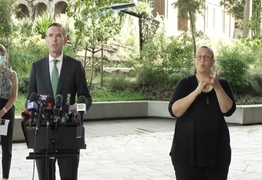Numbers not to be relied upon
Lee O'Connor
15 January 2022, 12:39 AM
 Counting COVID case numbers is no substitute for preparing for a positive test result.
Counting COVID case numbers is no substitute for preparing for a positive test result.As debate continues to rage about the value and practicalities of counting covid-19 cases, the numbers in each region are increasingly difficult to pin down, so residents are being encouraged to be prepared and make a plan for if - and when - you test positive.
Today's reported figures for the Western NSW Local Health District (LHD) relate to PCR tests only with 687 new cases identified up to 8pm on Friday 14 January.
RAT results for each District are currently not available, although from 12 January, you can report your positive Rapid Antigen Test via the Service NSW app, on the Service NSW website or by calling Service NSW on 13 77 88. The official advice is to not attend a service centre.
Despite the government mandating the legal requirement to report a positive Rapid Antigen Test result and introducing fines to those who fail to do so, RATs are still hard to come by in much of the western plains. It will take some time before the public are able to have confidence in the numbers in order to monitor the trends in their own area.
Of the 687 new cases identified from PCR testing, western plains town recorded the following numbers:
Warrumbungle - 13
Lachlan - 8
Narromine - 7
Gilgandra - 7
Warren - 6
Coonamble - 5
Bourke - 3
Bogan - 2
Brewarrina - 2
Cobar - 1
Numbers for Walgett shire were not available at the time of publication.
In the Western LHD there are now 34 people in hospital with one in intensive care.
Across NSW there are currently 2,576 COVID-19 cases admitted to hospital, including 193 people in intensive care, 58 of whom require ventilation.
A further 20 people with COVID-19 have died; 11 men and nine women.
One person was aged in their 20s, three people were aged in their 50s, one person was aged in their 60s, four people were in their 70s, nine people were in their 80s and two people were in their 90s.
Of the 20 people who died; 16 people were vaccinated against COVID-19 and four people were not vaccinated.
None were from the Western Local health district. Total deaths in NSW since start of pandemic now stands at 848.
Recovery is still by far the most likely outcome and, rather than relying on anecdotal advice from friends or family, new sources of information have been released.
What to do if you test positive
With more than a third of callers to the National Coronavirus Helpline asking about isolation, healthdirect has launched a guide to help those who are COVID-19 positive know what they should do while isolating at home and when to seek medical help.
The guide is a gateway to a comprehensive information hub with hundreds of FAQs about managing and recovering from COVID-19.
“Everyone with COVID-19 will experience their situation differently in terms of what arrangements they need to make and the severity of their symptoms,” says Healthdirect Australia, Chief Medical Officer, Dr Nirvana Luckraj.
“However, there are some crucial first steps to help stop the spread that should be done immediately. You should isolate straight away and inform people you have been in touch with recently so they can take appropriate action.
“We know people with mild symptoms can feel very sick. This website provides information on the range of symptoms to expect for ‘mild COVID’, so people with COVID-19 understand when it is appropriate to call on health services, such as 000."
“If you are worried about your symptoms, but it is not an emergency, use the COVID-19 Symptom Checker on the healthdirect website or call the National Coronavirus Helpline on 1800 020 080 for free information and advice,” says Dr Luckraj.
Royal Australian College of GPs (RACGP) President Dr Karen Price said that the guide would prove useful for many COVID-19-positive people.
“It’s great to see healthdirect providing this timely information to help people with COVID-19 take care of themselves at home,” says Dr Price.
“Some people, particularly older people and those with serious underlying health conditions, will require careful monitoring by a GP and potentially need hospital care if their condition deteriorates.
However, many people will be able to safely manage their condition at home by following the information in this guide."
“With more and more people contracting the virus, this will help ease pressure on our healthcare system. So, I encourage people to share this resource with their friends and family and learn what they can do to take care of themselves if they test positive for COVID-19,” says Dr Price.
The National Coronavirus Helpline (1800 020 080) is available 24 hours a day to answer questions about isolation, restrictions, vaccines, testing and symptoms.

